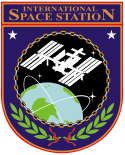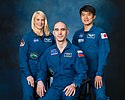Sojuz MS-01
| Dane misji | |
| Indeks COSPAR | 2016-044A |
|---|---|
| Zaangażowani | |
| Pojazd | |
| Statek kosmiczny | Sojuz MS |
| Masa pojazdu | ok. 7200 kg |
| Rakieta nośna | Sojuz-FG |
| Załoga | |
 Od lewej: K. Rubins, A. Iwaniszyn, T. Onishi | |
| Dowódca | Anatolij Iwaniszyn |
| Załoga | Takuya Onishi, Kathleen Rubins |
| Start | |
| Miejsce startu | Bajkonur |
| Początek misji | 7 lipca 2016, 1:36 UTC |
| Misja na Międzynarodową Stację Kosmiczną | |
| Lądowanie na ISS | Rasswiet |
| Pobyt na ISS | 112 d 20 h 29 min 9.07.2016, 04:06 UTC – 30.10.2016, 00:35 UTC |
| Lądowanie | |
| Miejsce lądowania | Kazachstan |
| Lądowanie | 30 października 2016, 03:59 UTC |
| Czas trwania misji | 115 d 2 h 22 min 33 s |
| Program Sojuz | |
Sojuz MS-01 – misja załogowa statku Sojuz do Międzynarodowej Stacji Kosmicznej. Start nastąpił 7 lipca 2016 r. o 1:36 UTC (3:36 czasu warszawskiego)[1]. Lądowanie miało miejsce 30 października 2016 o 3:59 UTC na wschód od Żezkazganu w Kazachstanie[2]. Był to pierwszy lot nowej wersji statku Sojuza, nazwanej Sojuz MS, i 130. lot ogółem kapsuły z serii Sojuz.
Zmiany pojazdu obejmowały usprawnione panele słoneczne i nowe systemy sterowania, w tym modyfikację systemu Kurs. W odróżnieniu od standardowych lotów do ISS, MS-01 przez dwa dni testował nowe systemy pojazdu, cumowanie do ISS odbyło się 9 lipca o godz 4:06 (UTC)[3][4].
Początkowo start misji MS-01 był planowany na marzec 2016, przed lotem Sojuza TMA-20M, uległ jednak kilkukrotnemu przesunięciu: najpierw z powodu opóźnienia startu pierwszego promu transportowego nowej serii (Progress MS-01) i polityki bezpieczeństwa polegającej na co najmniej dwukrotnym locie wersji bezzałogowej przed załogową, załogowy Sojuz MS musiał poczekać na Progress MS-02 i zamienić się kolejnością z TMA-20M. Ostatnie opóźnienie nastąpiło w czerwcu z powodu problemów z systemem kontroli lotu BURK[5].
Sojuz MS-01 pozostał zadokowany do ISS przez 112 dni i odcumował od stacji 30 października 2016 roku o 00:35 UTC[2].
Załoga
Podstawowa
- Anatolij Iwaniszyn (2) – dowódca (Rosja, Roskosmos)
- Takuya Onishi (1) – inżynier pokładowy (Japonia, JAXA)
- Kathleen Rubins (1) – inżynier pokładowy (USA, NASA)
Rezerwowa
- Oleg Nowickij – dowódca (Rosja, Roskosmos)
- Thomas Pesquet – inżynier pokładowy (Francja, ESA)
- Peggy Whitson – inżynier pokładowy (USA, NASA)
Galeria
Przypisy
- ↑ Michał Moroz, Start pierwszego Sojuza MS, kosmonauta.net, 7 lipca 2016 [dostęp 2016-07-12] (pol.).
- ↑ a b William Harwood, International space crew wraps up nearly four months in orbit, Spaceflight Now, 30 października 2016 [dostęp 2016-10-31] (ang.).
- ↑ Krzysztof Kanawka, Sojuz MS-01 na ISS, kosmonauta.net, 9 lipca 2016 [dostęp 2016-07-11] (pol.).
- ↑ Mark Garcia, Expedition 48-49 Crew Docks to New Home in Space, „blogs.nasa.gov/spacestation”, NASA, 9 lipca 2016 [dostęp 2016-07-11] (ang.).
- ↑ First Soyuz MS flies, www.russianspaceweb.com [dostęp 2016-07-12] (ang.).
Bibliografia
Linki zewnętrzne
- Space Facts (ang.)
Media użyte na tej stronie
The Soyuz MS-01 spacecraft is rolled out by train to the launch pad at the Baikonur Cosmodrome, Kazakhstan, Monday, July 4, 2016. NASA astronaut Kate Rubins, cosmonaut Anatoly Ivanishin of the Russian space agency Roscosmos, and astronaut Takuya Onishi of the Japan Aerospace Exploration Agency (JAXA) will launch from the Baikonur Cosmodrome in Kazakhstan the morning of July 7, Kazakh time (July 6 Eastern time.) All three will spend approximately four months on the orbital complex, returning to Earth in October.
This image was acquired after the launch of the Expedition 48-Crew on the Soyuz MS-01 spacecraft from the Baikonur Cosmodrome in Kazakhstan. The Soyuz spacecraft is approaching the International Space Station with new crew members Kate Rubins of NASA, Anatoly Ivanishin of Roscosmos, and Takuya Onishi of the Japan Aerospace Exploration Agency (JAXA).
The Soyuz MS-01 vehicle is seen docked to the International Space Station. The first of an upgraded variant of the Soyuz spacecraft, the vehicle carried Expedition 48/49 crew members Kate Rubins of NASA, Takuya Onishi of the Japan Aerospace Exploration Agency (JAXA) and Anatoly Ivanishin of Roscosmos to the orbiting laboratory for their four month stay onboard.
The Soyuz MS-01 spacecraft launches from the Baikonur Cosmodrome with Expedition 48-49 crewmembers Kate Rubins of NASA, Anatoly Ivanishin of Roscosmos and Takuya Onishi of the Japan Aerospace Exploration Agency (JAXA) onboard, Thursday, July 7, 2016 , Kazakh time (July 6 Eastern time), Baikonur, Kazakhstan. Rubins, Ivanishin, and Onishi will spend approximately four months on the orbital complex, returning to Earth in October.
NASA astronaut Kate Rubins, left, Russian cosmonaut Anatoly Ivanishin of Roscosmos, center, and astronaut Takuya Onishi of the Japan Aerospace Exploration Agency (JAXA) sit in chairs outside the Soyuz MS-01 spacecraft a few moments after they landed in a remote area near the town of Zhezkazgan, Kazakhstan on Sunday, Oct. 30, 2016 (Kazakh time).Rubins, Ivanishin, and Onishi are returning after 115 days in space where they served as members of the Expedition 48 and 49 crews onboard the International Space Station.
An Orthodox Priest blesses members of the media after he blessed the Soyuz rocket at the Baikonur Cosmodrome Launch pad on Wednesday, July 6, 2016 in Kazakhstan. Expedition 48-49 crewmembers Kate Rubins of NASA, Anatoly Ivanishin of Roscosmos and Takuya Onishi of the Japan Aerospace Exploration Agency (JAXA) will launch from the Baikonur Cosmodrome in Kazakhstan the morning of July 7, Kazakh time (July 6 Eastern time.) All three will spend approximately four months on the orbital complex, returning to Earth in October.
Anatoly Ivanishin of Roscosmos (left), Takuya Onishi of the Japan Aerospace Exploration Agency (JAXA) (middle) and Kate Rubins of NASA (right) arrive onboard the International Space Station. The trio launched from the Baikonur Cosmodrome in Kazakhstan on July 7 and arrived at the station after a two day rendezvous.
At the Gagarin Cosmonaut Training Center in Star City, Russia, Expedition 46-47 backup crew members Anatoly Ivanishin of the Russian Federal Space Agency (Roscosmos, left), Kate Rubins of NASA (center) and Takuya Onishi of the Japan Aerospace Exploration Agency (right) listen to reporters’ questions in front of a Soyuz simulator Nov. 19 at the start of qualification exams. They are the backups to the prime crewmembers, Yuri Malenchenko of Roscosmos, Tim Kopra of NASA and Tim Peake of the European Space Agency, who will launch Dec. 15 in the Soyuz TMA-19M spacecraft from the Baikonur Cosmodrome in Kazakhstan for a six-month mission on the International Space Station.
Expedition 49 official crew portrait with 47S crew (Anatoli Ivanishin, Kate Rubins, Takuya Onishi) and 48S crew (Shane Kimbrough, Andrei Borisenko, Sergei Ryzhikov). Photo Date: January 13, 2016. Location: Building 8, Room 183 - Photo Studio. Photographer: Robert Markowitz
Expedition 49 crew portrait with (from left) NASA astronaut Kate Rubins, Russian cosmonaut Anatoly Ivanishin (Expedition 49 Commander), and Japan Aerospace Exploration Agency (JAXA) astronaut Takuya Onishi.
At the Kremlin Wall in Moscow’s Red Square, Expedition 48-49 prime crew members Kate Rubins of NASA (left), Anatoly Ivanishin of Roscosmos (center) and Takuya Onishi of the Japan Aerospace Exploration Agency (right) pose for pictures May 31 during traditional pre-launch ceremonies. Rubins, Ivanishin and Onishi are scheduled to launch June 24 from the Baikonur Cosmodrome in Kazakhstan on the Soyuz MS-01 spacecraft for a four-month mission on the International Space Station.























